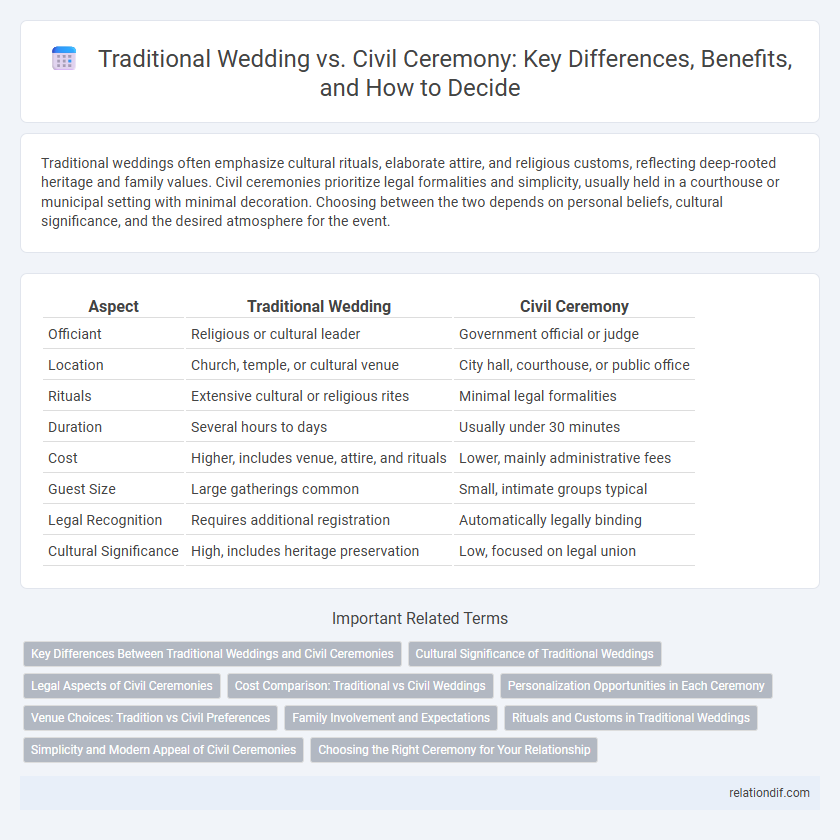Traditional weddings often emphasize cultural rituals, elaborate attire, and religious customs, reflecting deep-rooted heritage and family values. Civil ceremonies prioritize legal formalities and simplicity, usually held in a courthouse or municipal setting with minimal decoration. Choosing between the two depends on personal beliefs, cultural significance, and the desired atmosphere for the event.
Table of Comparison
| Aspect | Traditional Wedding | Civil Ceremony |
|---|---|---|
| Officiant | Religious or cultural leader | Government official or judge |
| Location | Church, temple, or cultural venue | City hall, courthouse, or public office |
| Rituals | Extensive cultural or religious rites | Minimal legal formalities |
| Duration | Several hours to days | Usually under 30 minutes |
| Cost | Higher, includes venue, attire, and rituals | Lower, mainly administrative fees |
| Guest Size | Large gatherings common | Small, intimate groups typical |
| Legal Recognition | Requires additional registration | Automatically legally binding |
| Cultural Significance | High, includes heritage preservation | Low, focused on legal union |
Key Differences Between Traditional Weddings and Civil Ceremonies
Traditional weddings often involve elaborate cultural or religious rituals, symbolic attire, and customary rites reflecting a couple's heritage, while civil ceremonies emphasize legal formalities conducted by authorized officiants in non-religious settings. Traditional weddings typically include large gatherings with extensive planning, music, and festive celebrations, whereas civil ceremonies are usually brief, straightforward, and held in government offices or courthouses. The legal recognition of marriage is the primary objective of civil ceremonies, whereas traditional weddings focus on both cultural expression and the establishment of marital bonds.
Cultural Significance of Traditional Weddings
Traditional weddings hold deep cultural significance, often reflecting the rich heritage, customs, and rituals unique to a community or ethnic group. These ceremonies typically involve symbolic practices, attire, and music that preserve ancestral traditions and reinforce social bonds among families. Unlike civil ceremonies, traditional weddings serve not only as a legal union but also as a meaningful celebration of cultural identity and collective memory.
Legal Aspects of Civil Ceremonies
Civil ceremonies offer legally binding marriages recognized by government authorities without religious affiliations. Couples must obtain a marriage license and comply with state-specific requirements, such as waiting periods or age restrictions. The official documentation from civil ceremonies ensures the couple's legal rights regarding property, inheritance, and tax benefits.
Cost Comparison: Traditional vs Civil Weddings
Traditional weddings often involve higher expenses due to venue rental, elaborate decorations, catering, and extensive guest lists, typically costing between $20,000 and $30,000 on average. Civil ceremonies are generally more affordable, with costs ranging from $200 to $2,000, as they require minimal decoration, shorter duration, and limited guest attendance. Couples seeking budget-friendly options tend to choose civil ceremonies to significantly reduce overall wedding expenditures.
Personalization Opportunities in Each Ceremony
Traditional weddings offer rich cultural rituals and symbolic customs that provide opportunities to personalize through attire, religious rites, and family involvement, reflecting deep-rooted heritage. Civil ceremonies emphasize flexibility, allowing couples to tailor vows, settings, and officiants to modern tastes without stringent cultural constraints. Both formats enable unique expressions of love, but traditional weddings prioritize ancestral continuity while civil ceremonies prioritize contemporary individualism.
Venue Choices: Tradition vs Civil Preferences
Traditional weddings often take place in religious venues such as churches, temples, or mosques, reflecting cultural and spiritual significance. Civil ceremonies typically prefer government offices, courthouses, or outdoor locations like parks to emphasize legal formalities and personal expression. Venue choice strongly influences the wedding's atmosphere, blending historical customs with contemporary preferences.
Family Involvement and Expectations
Traditional weddings often emphasize deep family involvement, with rituals and customs reflecting generational values and community expectations, creating a collective celebration. Civil ceremonies prioritize legal formalities and tend to involve fewer family members, focusing on the couple's personal commitment rather than extensive familial roles. Family expectations in traditional weddings usually include participation in planning and execution, whereas civil ceremonies allow more flexibility and private arrangements.
Rituals and Customs in Traditional Weddings
Traditional weddings are rich in rituals and customs that reflect cultural heritage, such as exchanging garlands, ceremonial blessings, and symbolic attire unique to each culture. These ceremonies often involve family participation, traditional music, and specific rites like the seven vows in Hindu weddings or the tea ceremony in Chinese weddings. Such rituals emphasize communal values and spiritual significance, contrasting with the more straightforward legal focus of civil ceremonies.
Simplicity and Modern Appeal of Civil Ceremonies
Civil ceremonies prioritize simplicity and modern appeal by offering a streamlined process with minimal legal formalities and customizable settings such as parks, beaches, or urban rooftops. Unlike traditional weddings that often involve elaborate rituals, lengthy preparations, and formal attire, civil ceremonies emphasize personalization and flexibility, accommodating diverse couples and contemporary values. This approach appeals to couples seeking an intimate, stress-free celebration without the constraints of conventional customs.
Choosing the Right Ceremony for Your Relationship
Selecting between a traditional wedding and a civil ceremony depends on personal values, cultural background, and legal requirements. Traditional weddings often emphasize cultural rituals and familial involvement, creating a deeply symbolic experience, while civil ceremonies focus on legal formalities and simplicity. Couples should consider their priorities, such as religious significance, budget, and desired atmosphere, to choose the ceremony that best reflects their relationship.
Traditional Wedding vs Civil Ceremony Infographic

 relationdif.com
relationdif.com